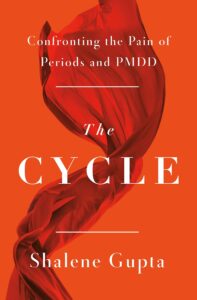 Most days, Shalene Gupta, author of The Cycle, was the person she’d always aspired to be. She was hardworking, excelled at work, and had a long-term boyfriend who she desperately loved.
Most days, Shalene Gupta, author of The Cycle, was the person she’d always aspired to be. She was hardworking, excelled at work, and had a long-term boyfriend who she desperately loved.
Then, every month like clockwork, it all came crashing down in fits of rage and inconsolable sorrow. Work became meaningless, and she struggled to get through the day. The lows were subterranean.
After years of struggling to get an answer from doctors, Shalene learned she was one of millions who live with premenstrual dysphoric disorder (PMDD), a severe form of PMS. The physical and mental effects of this disorder are undeniable, but for decades some doctors didn’t even consider PMDD a real condition. How could so many people be suffering at the hands of a chronic condition that doesn’t even exist?
The Cycle uncovers a hidden epidemic, delivering the definitive portrait of a widespread chronic illness most people haven’t even heard of. From a historical overview of feminist debates, to on-the-ground interviews and a searing critique of menstrual stigma, Shalene Gupta lays out how disregard for this disorder has left too many people scrambling for appropriate healthcare. Deeply researched, movingly intimate, and refreshingly hopeful, this book is essential reading for any curious reader, especially those navigating a world ill-equipped to support their health.
Christine: The Cycle starts from a very personal place- your own struggle with PMDD. Was this central to your motivation to write this book?
Shalene: At first, I was very resistant to writing about PMDD—I really didn’t want to have to write about the worst moments of my life. When I got my book contract, I actually froze for a month, but I also couldn’t live with not writing the book. I was so desperate I ended up working with Joanne Mallon, a media coach, who asked me: who are you writing this book for? I thought about what my life would have looked like if someone had told me about PMDD earlier and burst into tears. I wondered about who else might be out there that has PMDD and has never heard of it.
The Cycle makes clear that PMDD is a poorly understood, under-researched disorder. How did you go about researching this subject when there is so little known about it?
In some ways that made it easier because there was a distinct and manageable body of work to draw upon. Anne Figert wrote a dissertation called Women and the Ownership of PMS which is a meticulously detailed history of the debate over whether not to make PMDD an official diagnosis, which I’m particularly grateful for—I stand on the shoulders of giants, and she’s one of them.
My previous book was on business and trust and it quickly became clear that I could spend ten lifetimes reading everything there was on business and trust and still not reach the end of it, and in some ways that was harder. I was always worried there was something important I hadn’t managed to read.
Given the subject matter and current political climate, did you have any pushback on your proposal for this book? Was there a lot of interest from publishers?
I feel really lucky—I think ten years ago this wouldn’t have been published, but we’re having more conversations about menstruation and mental health. Even so, I did get a few comments from editors saying that books on menstruation don’t sell.
The disorder known as PMS is a frequent punchline in misogynistic humor, frequently used to justify sexist opinions about women, in particular our ability to function rationally in a professional environment. However, you highlight that the severity of the symptoms associated with PMDD, in addition to the common burden of menstrual stigma, make this a particularly debilitating disorder. How did you balance the competing narratives of bigotry and science around health and gender?
I felt like it all folded into the bigger story. A lot of people are asking me why it took so long to get diagnosed—in retrospect it seems obvious something was wrong. Understanding why people don’t know about PMDD has a lot to do with the history of menstrual stigma and bigotry—there were huge debates in the 1980s over whether or not PMDD was real, or a disorder that was invented to stigmatize menstruation. Sadly, there are still people today who think PMDD is made up. Understanding that PMDD is real has a lot to do with understanding the science and biological realities of PMDD.
On the 7 AM Novelist, you shared that you have experienced harassment across social media because you used the word “menstruators” in your book. Is there anything you would like to say about that situation?
F— bigots. <3
I imagine the harassment was coming from a place of pain and fear. Women’s bodies and women’s rights are currently under attack in the US, and we have a long history that’s steeped in sexism. There’s a lot to be angry about. But excluding trans people is not the way forward, trans people didn’t inflict these wounds, and guess what? Trans men and nonbinary people can have PMDD and period problems.
These dust-ups take energy away from the real issues. I would love to see all the harassment I got channeled towards fighting for abortions, birth control access, and better reproductive healthcare.
This is your second nonfiction book, but you are also a novelist and a graduate of Grubstreet’s Novel Incubator program. For you, what are some of the differences in your processes of writing fiction and nonfiction?
I feel like the key difference is for nonfiction the main challenge is you have to go find the story and then figure out the most interesting way to tell it. For fiction you have to invent the story and figure out if it’s interesting or if there are things you can do to change it. Sometimes that feels like too much power!
You have an extensive background in journalism and research. How helpful was this background in completing book-length works of popular research? What advice do you have for writers who would like to publish similar stories?
I found my journalism background really helpful because I’m shy. Journalism taught me it is okay to email strangers and ask them to talk to you about anything—and that’s my advice for writers who want to write nonfiction that requires interviewing people. Go for it! You don’t need a journalism background; you just need to give yourself permission to ask questions and search for answers. People love sharing their story and talking about their work. For every person who declines an interview, there will be ten more who want to chat, so just keep looking until you find them.
You’re such a baller, Shalene! How do you balance your many freelance editorial projects and public speaking engagements with your research-based publications and your creative projects?
I’m so flattered! Short answer: I didn’t. After I turned in The Cycle, I got very sick and had to take a few months off—it was a shock because I’d loved every minute of researching and writing The Cycle as well as doing my other work. I didn’t want to take the time off, but my head was mush and I managed to come down with every affliction possible. I spent something like four months obsessively playing Stardew Valley as part of my recovery.
What are you hoping readers get from The Cycle?
I’m hoping readers with PMDD feel seen; people who don’t have PMDD understand the connection between mood and hormones; but mostly that people will start to talk about the stigmatized topics in their own lives. Writing this book taught me I’ve never been alone—and I think that’s true for all of us.
I have to ask- what other titles did you consider for this work? The Curse? Blood Bath? Angry Aunt Flo?
Now I’m kind of sad I didn’t think of The Curse or Blood Bath! I’m notoriously bad at titles. My strategy is to submit my work untitled, and go ‘la la la, I can’t hear you,’ when someone asks for a title. Pro tip, that is a really bad strategy. Don’t do it.
Originally the book was called Bloody Hell, which I honestly still think is my peak titling work. We changed it to The PMS Problem when it went out on submission, but worried that it didn’t have PMDD in the title. At the same time PMDD isn’t well known enough that we thought we could do the The PMDD Problem. Then I got desperate. Crimson Tide! Shark Week! (The giant shark on the cover would have been awesome). Code Red! Thankfully my editors stepped in with The Cycle and ignored my emails about sharks.
Shalene Gupta is a writer and journalist. She’s the author of The Cycle: Confronting the Pain of Periods and PMDD, and co-author of The Power of Trust. In the past she’s been a financial specialist for the Department of Treasury, a reporter for Fortune, a researcher at Harvard Business School, and taught English in Malaysia on a Fulbright scholarship. Her work has appeared in The Atlantic, ESPN, Fast Company, Fortune and Harvard Business Review among other places. She was awarded a Fulbright scholarship and is a graduate of Columbia Journalism School and Johns Hopkins. She lives in Cambridge, Massachusetts.


1 comment